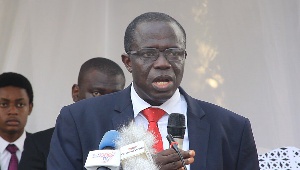A Justice of the Appeal’s Court Justice Dennis Adjei has called for a review of some of the acts of law within the constitution. Citing a number of examples, he noted that there was the need to redefine the laws if it is to be used as an instrument of change and a tool for development.
Speaking at the opening ceremony of the GIMPA Law week, Justice Dennis Adjei stated that the definition of corruption in Ghana is insufficient and as such must be redefined.
He noted that the description of some corrupt acts per the constitution as misdemeanors were insufficient looking at the punishments which were meted out, adding that there were calls for the name to be changed to felony to serve as deterrents.
Justice Adjei challenged the provision of punishments meted out to offenders within the public sector to be widened to cover the public sector as well.
“A look at our criminal and other procedure offenses act, act 30 provides punishment for corruption. But if you go to the criminal offenses itself, act 29, which creates corruption, basically it has created not less than 16 subheadings to the offense… one thing about it is that it has been described as misdemeanor. The impression that has been created that whenever we talk about the word misdemeanor, what we’re saying is that a sentence that may be imposed should not exceed 3years but that is not wholly true. An offense could be a misdemeanor but the lawmaker may provide a sentence up to 25years... our definition itself is insufficient and needs to be defined”, Justice Dennis Adjei said.
Again the Appeal’s Court Judge indicated that the incidence of using the terms of sentence as a criteria to withdraw pension packages of public sector workers was discriminatory and thus should be revised.
“Somebody may commit an offense of corruption and may be convicted. If the person is convicted and the person is sentenced to 2years then the person goes home with his pension and everything, but where the person is sentenced to 3years, then the person loses everything…. I think it’s unfair. Every corruption is corruption, he noted.
Click to view details



General News of Monday, 3 April 2017
Source: www.ghanaweb.com

















